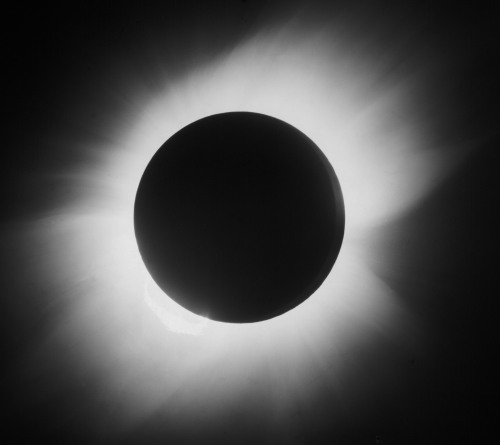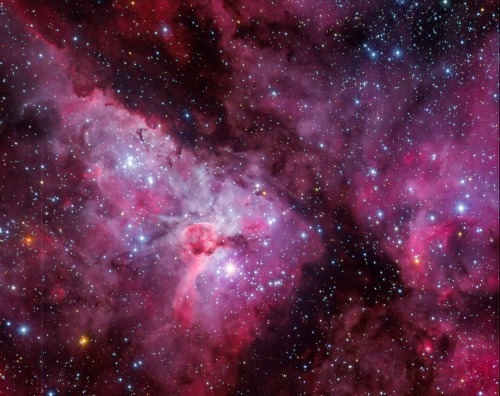The Full Moon Of 2021 Via NASA Https://ift.tt/3FWxNTm

The Full Moon of 2021 via NASA https://ift.tt/3FWxNTm
Every Full Moon of 2021 shines in this year-spanning astrophoto project, a composite portrait of the familiar lunar nearside at each brightest lunar phase. Arranged by moonth, the year progresses in stripes beginning at the top. Taken with the same camera and lens the stripes are from Full Moon images all combined at the same pixel scale. The stripes still looked mismatched, but they show that the Full Moon’s angular size changes throughout the year depending on its distance from Kolkata, India, planet Earth. The calendar month, a full moon name, distance in kilometers, and angular size is indicated for each stripe. Angular size is given in minutes of arc corresponding to 1/60th of a degree. The largest Full Moon is near a perigee or closest approach in May. The smallest is near an apogee, the most distant Full Moon in December. Of course the full moons of May and November also slid into Earth’s shadow during 2021’s two lunar eclipses.
(Published January 01, 2022)
More Posts from Chbnb and Others

Cone and Foxfur Nebulae

Tiny Ellipse



Happy Birthday, Albert Einstein! Genius Scientist Turns 140 Years Old Today.
The year 1905 came to be known as Einstein’s Miracle Year. He was 26 years old, and in that year he published four papers that reshaped physics.
Photoelectric effect
The first explained what’s called the photoelectric effect – one of the bases for modern-day electronics – with practical applications including television. His paper on the photoelectric effect helped pave the way for quantum mechanics by establishing that light is both a particle and a wave. For this work, Einstein was later awarded a Nobel Prize in physics.


Brownian motion
Another 1905 paper related to Brownian motion. In it, Einstein stated that the seemingly random motion of particles in a fluid (Brownian motion) was a predictable, measurable part of the movement of atoms and molecules. This helped establish the Kinetic Molecular Theory of Heat, which says that, if you heat something, its molecules begin to vibrate. At this same time, Einstein provided definitive confirmation that atoms and molecules actually exist.


Special relativity
Also in 1905, Einstein published his Special Theory of Relativity. Before it, space, time and mass all seemed to be absolutes – the same for everyone. Einstein showed that different people perceive mass, space and time differently, but that these effects don’t show up until you start moving nearly at the speed of light. Then you find, for example, that time on a swiftly moving spaceship slows down, while the mass of the ship increases. According to Einstein, a spaceship traveling at the speed of light would have infinite mass, and a body of infinite mass also has infinite resistance to motion. And that’s why nothing can accelerate to a speed faster than light speed. Because of Einstein’s special relativity, light is now seen as an absolute in a universe of shifting values for space, time and matter.

Mass-energy equivalence
The fourth 1905 paper stated that mass and energy are equivalent. You perhaps know something of this work in Einstein’s famous equation E=mc2. That equation means that energy (E) is equal to mass (m) multiplied by the speed of light © squared. Sound simple? It is, in a way. It means that matter and energy are the same thing. It’s also very profound, in part because the speed of light is a huge number. As shown by the equation, a small amount of mass can be converted into a large amount of energy … as in atomic bombs. It’s this same conversion of mass to energy, by the way, that causes stars to shine.
But Einstein didn’t stop there. As early as 1911, he’d predicted that light passing near a large mass, such as a star, would be bent. That idea led to his General Theory of Relativity in 1916.


This paper established the modern theory of gravitation and gave us the notion of curved space. Einstein showed, for example, that small masses such as planets form dimples in space-time that hardly affect the path of starlight. But big masses such as stars produce measurably curved space.





The fact that the curved space around our sun was measurable let other scientists prove Einstein’s theory. In 1919, two expeditions organized by Arthur Eddington photographed stars near the sun made visible during a solar eclipse. The displacement of these stars with respect to their true positions on the celestial sphere showed that the sun’s gravity does cause space to curve so that starlight traveling near the sun is bent from its original path. This observation confirmed Einstein’s theory, and made Einstein a household name.

Source (read more) posts about Einstein

“A splash of wild…“ by | Glenn Lee Robinson










Milky Way Paradise by Ian Inverarity
![Galactic Center [OC]](https://64.media.tumblr.com/a7b304724028dcc9ef39bb4ec082169d/e5d98b62ae9f6a6b-69/s500x750/098a6838fb8ecd210268e0d1efd3024af8c07333.jpg)
Galactic center [OC]

The Great Carina Nebula

Sh2-224 // Alfred Leitgeb
-
 mspurplekris reblogged this · 3 years ago
mspurplekris reblogged this · 3 years ago -
 mspurplekris reblogged this · 3 years ago
mspurplekris reblogged this · 3 years ago -
 mspurplekris reblogged this · 3 years ago
mspurplekris reblogged this · 3 years ago -
 mspurplekris liked this · 3 years ago
mspurplekris liked this · 3 years ago -
 firstaudrina liked this · 3 years ago
firstaudrina liked this · 3 years ago -
 junemermaid reblogged this · 3 years ago
junemermaid reblogged this · 3 years ago -
 cooltobias321 liked this · 3 years ago
cooltobias321 liked this · 3 years ago -
 rubynye liked this · 3 years ago
rubynye liked this · 3 years ago -
 colorado-brunette liked this · 3 years ago
colorado-brunette liked this · 3 years ago -
 chbnb reblogged this · 3 years ago
chbnb reblogged this · 3 years ago -
 chbnb liked this · 3 years ago
chbnb liked this · 3 years ago -
 fuckyeahcelestialthings reblogged this · 3 years ago
fuckyeahcelestialthings reblogged this · 3 years ago -
 antiantemeridian reblogged this · 3 years ago
antiantemeridian reblogged this · 3 years ago -
 harleysturg6969 liked this · 3 years ago
harleysturg6969 liked this · 3 years ago -
 sharonbphotos liked this · 3 years ago
sharonbphotos liked this · 3 years ago -
 themidgardiansongstress reblogged this · 3 years ago
themidgardiansongstress reblogged this · 3 years ago





